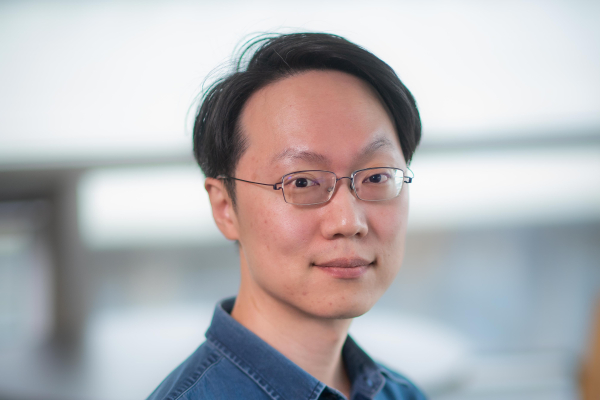
Dr. Yoon wins High Impact Award for his paper on AI’s role in education
What should AI’s role be in education?
That’s partly what Associate Professor Dr. Dongwook Yoon and his team of researchers set out to uncover in their research paper written in 2021: The impact of artificial intelligence on learner–instructor interaction in online learning.
The insightful paper has resulted in its authors being awarded a prestigious High Impact Award by the International Journal of Educational Technology in Higher Education (ETHE). The award recognizes papers with significant academic impact that have been published in the journal in the last ten years (from 2014 to 2024). Only six papers total won the coveted award.
AI: a help and a hinder
With the benefits of AI-driven platforms, it’s easy to imagine how AI can greatly augment a student’s learning. But, as Dr. Yoon points out, “Like with everything, there are pros and cons,” and his research methodically uncovered what those might be.
Dr. Yoon explained, “AI can provide a student with instant answers, 24/7 to any questions they may have. But, what if AI is not providing the same answers as the professor? Often, students will trust the AI answer more than an instructor’s answer.” Therein, lies the concern.
He said, “Students start to experience diminishing agency over their studies and work. What is left to think about, if AI is doing all the thinking for them? And as the Greek Philospher Plutarch expressed in one of his journals, that in essence, learning is not about filling a bucket. It’s about starting a fire that creates an impulse to think independently and a strong desire for the truth.”
Dongwook points out that the social aspects of learning through interacting with other students and instructors, can be significantly dwarfed by AI. The process then becomes mechanical and lacklustre in terms of engaging a student’s multi-dimensional brain. In other words: no fire. Over time, erosion in the desire to learn, engage and utilize one’s creativity could stunt a student’s development.

A great boost to Dr. Yoon’s research
Dr. Yoon expressed that he is excited on multiple levels to have won this award alongside his co-authors, Kyoungwon Seo (a UBC ECE Post Doc at the time), Joice Tang (a CS Undergrad Summer Research Intern at the time), Ido Roll, and Sidney Fels (UBC ECE Professor). “We worked hard to hone the methodology so it would be robust and provide structured findings. This award is especially poignant for Joice and Kyoungwon because they are up and coming in their research careers. Similarly, it was an honour to be their mentors. It’s also a confirmation of my efforts and convictions in caring about humans and human agency in AI-augmented education.”
A unique and inter-disciplinary approach
Dr. Yoon credits the unique approach and style of the paper as contributing factors to its selection for the award. He points out it is inter-disciplinary in nature, being at the intersection of computer science and education, and using the Speculative Design Method the paper employed (which was uncommon in the domain of technology and education at the time). The intent was to capture existing norms and the participants’ perceptions. The team did this using cartooned scenarios and tracked the responses to the scenarios presented. [Figure 1]

Figure 1. An example of a potential interaction with a student and AI, using cartoon representation.
What is speculative design method?
A double-edged sword
In the paper’s conclusion, the researchers state that the study found students and instructors perceive the impact of AI systems on education as double-edged swords, with some positives also leading to negatives.
For example, students and instructors appreciated the thorough responses they can receive from AI communications, but at the same time they were concerned about AI-based misunderstandings or misleadingness. And although they also valued the just-in-time, personalized support of AI, they feared that AI would limit their ability to learn independently. Lastly, students and instructors valued the social interaction cues provided by AI, but they are uncomfortable with the loss of privacy due to AI’s excessive data collection.
The future
More research is needed and Dr. Yoon is determinedly on that path, as are a group of grad students he supervises. He is currently undertaking an empirical study about how people use AI systems in education, and also building a ChatBot to augment the job of Teaching Assistants.
Another area Dongwook is pursuing passionately is exploring how diverse and under-represented groups currently use AI systems. The intent is to determine if there are differing needs that should be addressed as the technology is being built out.
As AI continues to revolutionize education, Dr. Yoon and his team are illuminating the promise and perils of this technological leap. Their award-winning research serves as a guiding tool to help educators and students navigate the complex landscape of AI-augmented learning. As Dr. Yoon's work demonstrates, that in the race to embrace AI, we must not lose sight of the human element that ignites true learning. It's the human spark itself that ultimately fans the flames of knowledge.
Congratulations to Dr. Yoon and his research team for not only winning the award, but for digging deep into the interplay of AI and education in the best interest of robust human learning.
Criteria for the award
The ETHE’s High Impact Paper Award recognizes papers with significant academic impact that have been published in the journal in the last ten years. The review committee evaluated papers against both quantitative and qualitative metrics. The quantitative metrics included the most downloads, the most number of citations and the highest altimetric attention scores. Qualitative metrics included assigning and aggregating scores against transcending disciplinary boundaries, addressing real-world challenges, contributing to societal advancement or policy-making, and enhancing technology in teaching and learning.